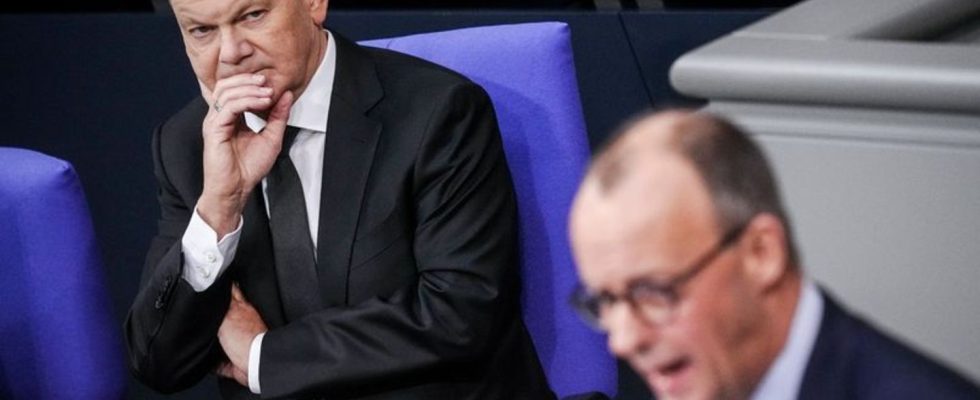Economic plans
Traffic light and Union: Hardened fronts when it comes to company relief
The economic policy stance of Friedrich Merz (r), among others, causes “irritation” in Chancellor Olaf Scholz (l). photo
© Kay Nietfeld/dpa
The Union writes letters to the federal government. It’s about how the economy can be stimulated. The traffic light calls on the Union to end a blockade.
In the dispute over relief for the German economy, the fronts are divided The federal government and the Union hardened. A government spokeswoman criticized a letter from the Union faction leadership to Chancellor Olaf Scholz (SPD). “There is a slight irritation about this letter if you look at the Union’s actual actions, especially in connection with the Growth Opportunities Act,” she said.
The Union continues to make approval of the law dependent on the traffic light reversing the abolition of the tax relief for agricultural diesel.
Finance Minister Christian Lindner (FDP) said during a visit to London: “The best contribution to the credibility of the Union’s proposals would be to remove the blockade against the Growth Opportunities Act presented by the federal government. Anyone who wants even more relief in the tax area should do so “At least start by agreeing to what’s on the table.” The Ministry of Finance is also working on further tax policy proposals.
Union parliamentary group vice-president Jens Spahn (CDU) told the German Press Agency: “The so-called Growth Opportunities Act falls far short, the relief is meager and the traffic lights had overloaded it with bureaucracy. We are now doing much better in the mediation process, we also want to relieve the burden on agriculture “But it won’t be a big hit anymore.” Germany needs a “fundamental change” in economic policy.
Federal government reacts to Union letter with criticism
In view of the economic downturn, Union parliamentary group leader Friedrich Merz (CDU) and CSU regional group leader Alexander Dobrindt proposed twelve measures for the next two months in a letter to Scholz. These include a permanent reduction in electricity tax to the European minimum as well as stronger sanctions for refusing to accept employment from citizens’ benefit recipients.
The government spokeswoman said that the Growth Opportunities Act aims to massively support companies and the German economy. Everyone who actually cares about dynamizing the German economy should first of all agree to this law, said the spokeswoman in the direction of the Union.
Green Party leader Omid Nouripour was “a bit surprised” by the Union’s letter. “They write down what comes to mind and once again don’t explain how they want to finance it,” he said in Berlin. “And at the same time they declare that they do not want to touch the debt brake.”
Lindner wants reforms
Lindner called on the traffic light coalition to move more quickly and ambitiously with structural reforms to increase German competitiveness. Economics Minister Robert Habeck (Greens) and he are both of the opinion that Germany is currently no longer competitive, he said after a meeting with German entrepreneurs and representatives of the financial industry in London. The reason is not only the weak global economy, but also structurally worse conditions. “I hope we will draw the necessary conclusions from this,” said Lindner. At least it would be unthinkable for him not to draw any conclusions from such a situation analysis.
Scholz considers the new volume of the growth package to be too low
The Federal Council had blocked the Growth Opportunities Act because it led to a loss of income for the states. The volume of relief in the mediation process is now expected to fall from the planned seven billion euros to three billion euros. Last Friday, according to traffic light, negotiators reached an agreement – but the Union only wants to agree if the agricultural diesel cuts are reversed.
The government spokeswoman said that Chancellor Scholz was of the opinion that a larger volume would be the right thing for the economy. The mediation committee meets on February 21st.
Spahn said that both Habeck and Lindner saw Germany as a location in acute danger. “It’s high time to act accordingly. We should now really stop complaining about a mediation process that was our own fault.”
Nouripour criticized the Union for rejecting negotiations with the government after Merz’s words. “I don’t think this is a responsible policy.” The Green Party leader called on the Union to agree to the Growth Opportunities Act, which is stuck in the Federal Council. This is a contribution to easing the burden on the economy and stimulating investment.

